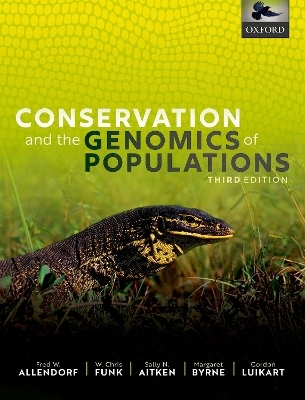
Conservation and the Genomics of Populations
Oxford University Press (Verlag)
978-0-19-885657-3 (ISBN)
New genomic techniques and statistical analyses are crucial tools for the conservation geneticist. This accessible and authoritative textbook provides an essential toolkit grounded in population genetics theory, coupled with basic and applied research examples from plants, animals, and microbes. The book examines genetic and phenotypic variation in natural populations, the principles and mechanisms of evolutionary change, evolutionary response to anthropogenic change, and applications in conservation and management.
Conservation and the Genomics of Populations helps demystify genetics and genomics for conservation practitioners and early career scientists, so that population genetic theory and new genomic data can help raise the bar in conserving biodiversity in the most critical 20 year period in the history of life on Earth. It is aimed at a global market of applied population geneticists, conservation practitioners, and natural resource managers working for wildlife and habitat management agencies. It will be of particular relevance and use to upper undergraduate and graduate students taking courses in conservation biology, conservation genetics, and wildlife management.
Fred W. Allendorf is a Regents Professor Emeritus at the University of Montana, USA. He was awarded the Molecular Ecology Prize in 2015, and he was elected to the American Academy of Arts and Science in 2019. He is a past President of the American Genetic Association, and former Director of the Population Biology Program of the US National Science Foundation. He has taught conservation genetics throughout the world, including the University of Western Australia, the Victoria University of Wellington, the University of Costa Rica, the Organization for Tropical Studies in Costa Rica, and the National Zoological Garden of South Africa. W. Chris Funk is a Professor in the Department of Biology and Director of the Global Biodiversity Center at Colorado State University, USA. He has published over 100 articles on the conservation genomics and evolutionary ecology of amphibians, fish, birds, mammals, and stream insects in North and South America. He is a Leopold Leadership Fellow and was a Fulbright Scholar at the Universidad del Los Andes, Bogotá, Colombia. He is actively involved in improving the incorporation of genetics into international conservation policy as a member of the IUCN Conservation Genetics Specialist Group, GEO BON Genetic Composition Working Group, and SCB Conservation Genetics Working Group. Sally N. Aitken is a Professor in the Department of Forest and Conservation Sciences in the Faculty of Forestry at the University of British Columbia, Canada. She leads the Centre for Forest Conservation Genetics. Her research integrates genomic, phenotypic, and climatic data to understand the processes driving local adaptation to climate, and how management can facilitate the adaptation of populations to new climates and other threats. She received the Canadian Forestry Scientific Achievement Award in 2009, the International Union of Forest Research Organization's Scientific Achievement Award in 2014, and was elected a Fellow of the Royal Society of Canada in 2017. Margaret Byrne is Executive Director of Biodiversity and Conservation Science in the Western Australian Department of Biodiversity, Conservation and Attractions, and is an Adjunct Professor at the University of Western Australia and Curtin University in Western Australia. She serves on the Australian Academy of Sciences National Committee for Ecology, Evolution and Conservation, and the Management Committee for the Genetics Society of Australasia. She undertakes conservation genetics research to inform biodiversity conservation strategies for rare and threatened species and for management of landscapes, including climate adaptation. She leads a strong science group providing an evidence-based approach to conservation management and policy in Western Australia. Gordon Luikart is a Professor at the University of Montana, USA. He has published numerous articles on the conservation and genetics of fish, mammals, and insects. He was a Fulbright Scholar at Latrobe University in Melbourne Australia, and won a Bronze medal as top scientist in France's CNRS. He was named one of the “Most Influential Scientific Minds” in 2014 by Thomson Reuters for publishing highly-cited papers. He taught conservation genetics in Portugal, South Africa, and globally on-line. He actively works to incorporate genetics into conservation as a member of the IUCN Conservation Genetics Specialist Group, and GEO BON Genetic Working Groups.
Preface
PART I: INTRODUCTION
1: Introduction
2: Phenotypic Variation in Natural Populations
3: Genetic Variation in Natural Populations
4: Population Genomics
PART II: MECHANISMS OF EVOLUTIONARY CHANGE
5: Random Mating Populations: Hardy-Weinberg Principle
6: Small Populations and Genetic Drift
7: Effective Population Size
8: Natural Selection
9: Population Subdivision
10: Beyond Individual Loci
11: Quantitative Genetics
12: Mutation
PART III: EVOLUTIONARY RESPONSE TO ANTHROPOGENIC CHANGES
13: Hybridization
14: Invasive Species
15: Exploited Populations
16: Climate Change
PART IV: CONSERVATION AND MANAGEMENT
17: Inbreeding Depression
18: Demography and Extinction
19: Population Connectivity
20: Units of Conservation
21: Conservation Breeding and Restoration
22: Genetic Identification
23: Genetic Monitoring
24: guest chapter author Helen R. Taylor: Conservation Genetics in Practice
Glossary
COMPANION WEBSITE MATERIALS (Available at www.oup.com/companion/AllendorfCGP3e )
Appendix: Probability, Statistics, and Coding
References
| Erscheinungsdatum | 20.12.2021 |
|---|---|
| Zusatzinfo | 321 colour line figures/illustrations and 43 tables |
| Verlagsort | Oxford |
| Sprache | englisch |
| Maße | 190 x 248 mm |
| Gewicht | 1686 g |
| Themenwelt | Naturwissenschaften ► Biologie ► Genetik / Molekularbiologie |
| Naturwissenschaften ► Biologie ► Ökologie / Naturschutz | |
| ISBN-10 | 0-19-885657-1 / 0198856571 |
| ISBN-13 | 978-0-19-885657-3 / 9780198856573 |
| Zustand | Neuware |
| Informationen gemäß Produktsicherheitsverordnung (GPSR) | |
| Haben Sie eine Frage zum Produkt? |
aus dem Bereich


